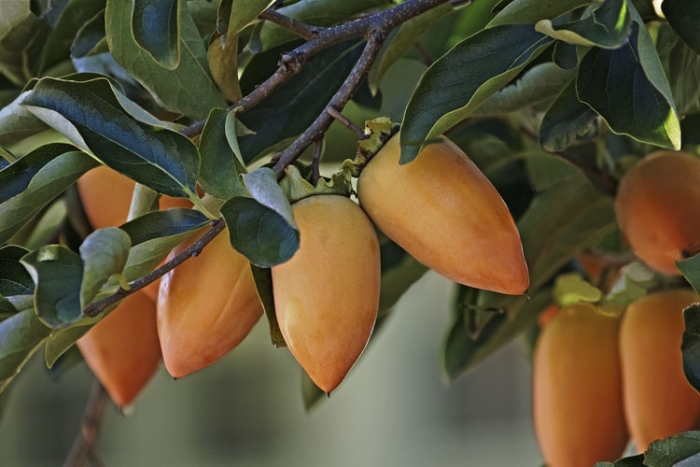Japanese Persimmon
(Diospyros kaki)
Japanese Persimmon (Diospyros kaki)
/
/

Dr. Nick V. Kurzenko
Public Domain
Image By:
Dr. Nick V. Kurzenko
Recorded By:
Copyright:
Public Domain
Copyright Notice:
Photo by: Dr. Nick V. Kurzenko | License Type: Public Domain | License URL: http://creativecommons.org/licenses/publicdomain/ | Attribution: 2014 Nick Kurzenko | Publisher: Calphotos |













































Estimated Native Range
Summary
Diospyros kaki, commonly known as Japanese Persimmon, is a deciduous tree native to China where it has been in cultivation for over 2,000 years. It was introduced to Japan and Korea in the 7th and 14th centuries respectively. It can be found in forest margins, open woodlands, and farmsteads where it enjoys generally mild climates. The tree resembles an apple tree in shape and can reach up to 10 meters (33 ft) in height. It does not typically bear fruit until 3 to 6 years of age. The creamy white flowers, 2.0 to 2.5 cm (0.8 to 1.0 in) wide, bloom in late spring or early summer and vary in color; female flowers are solitary, while male flowers may have a pink tint and appear in clusters. Diospyros kaki is usually dioecious, with separate male and female trees, but some cultivated varieties are monoecious with both sexes on one tree, including perfect flowers. Seedless fruit is produced parthenocarpically, but pollination can increase fruit yield and seed presence. Fruit drop is significant, with two main periods of loss, one after flowering and another in August. The edible fruit ripens in late autumn, becoming sweet and slightly tangy with a soft to fibrous texture.
Japanese Persimmon is valued for its sweet fruit and is often used in fruit production, ornamental plantings, and as a specimen tree in gardens. It is known for its striking appearance when laden with fruit after leaf fall. The tree requires full sun and adapts to various soil types with slow to fast drainage. It is moderately drought-tolerant but benefits from regular watering to reduce fruit drop. While generally easy to maintain, it can suffer from pests like persimmon psylla and diseases such as anthracnose.CC BY-SA 4.0
Japanese Persimmon is valued for its sweet fruit and is often used in fruit production, ornamental plantings, and as a specimen tree in gardens. It is known for its striking appearance when laden with fruit after leaf fall. The tree requires full sun and adapts to various soil types with slow to fast drainage. It is moderately drought-tolerant but benefits from regular watering to reduce fruit drop. While generally easy to maintain, it can suffer from pests like persimmon psylla and diseases such as anthracnose.CC BY-SA 4.0
Plant Description
- Plant Type: Trees
- Height: 20-30 feet
- Width: 20-30 feet
- Growth Rate: Moderate
- Flower Color: N/A
- Flowering Season: Spring
- Leaf Retention: Deciduous
Growth Requirements
- Sun: Full Sun
- Water: Medium
- Drainage: Fast, Medium, Slow
Common Uses
Bee Garden, Bird Garden, Butterfly Garden, Drought Tolerant, Edible*Disclaimer: Easyscape's listed plant edibility is for informational use. Always verify the safety and proper identification of any plant before consumption., Fragrant, Street Planting
Natural Habitat
Forest margins and open woodlands
Other Names
Common Names: Kaki , Chinese Persimmon , Oriental Persimmon , Sharon Fruit , 감나무 , 柿 , Kaki Persimmon
Scientific Names: Diospyros kaki , Diospyros kaki var. silvestris , Diospyros kaki var. kaki , Diospyros roxburghii , Diospyros kaempferi , Diospyros sphenophylla , Diospyros sinensis , Diospyros schi-tse , Diospyros argyi , Diospyros chinensis
GBIF Accepted Name: Diospyros kaki L.f.